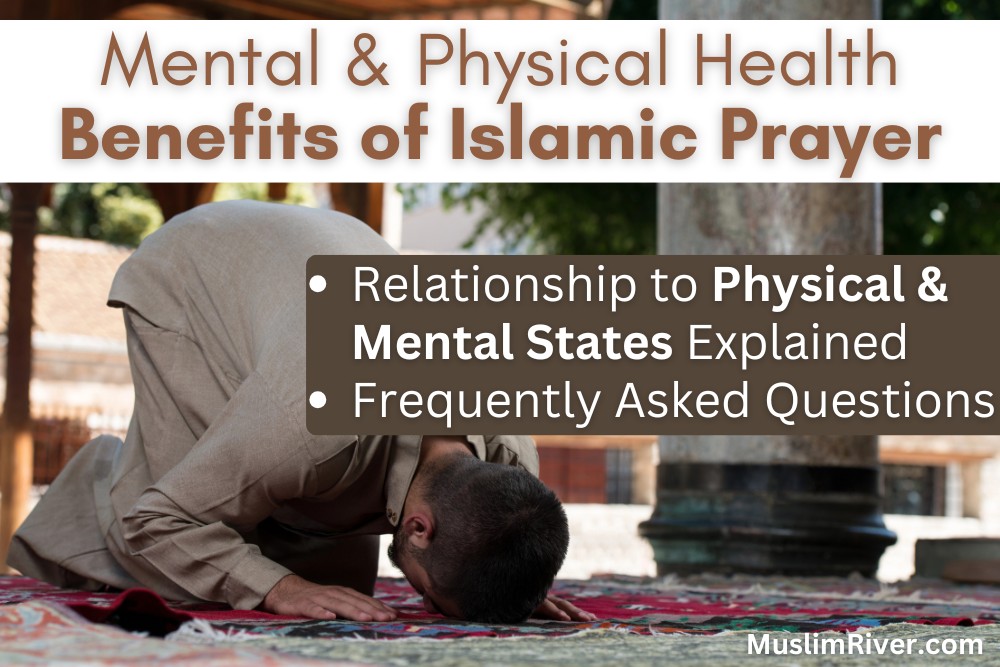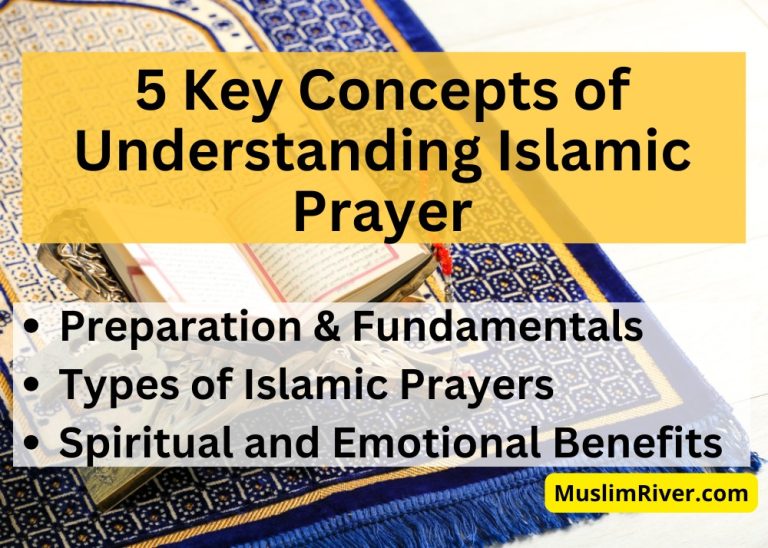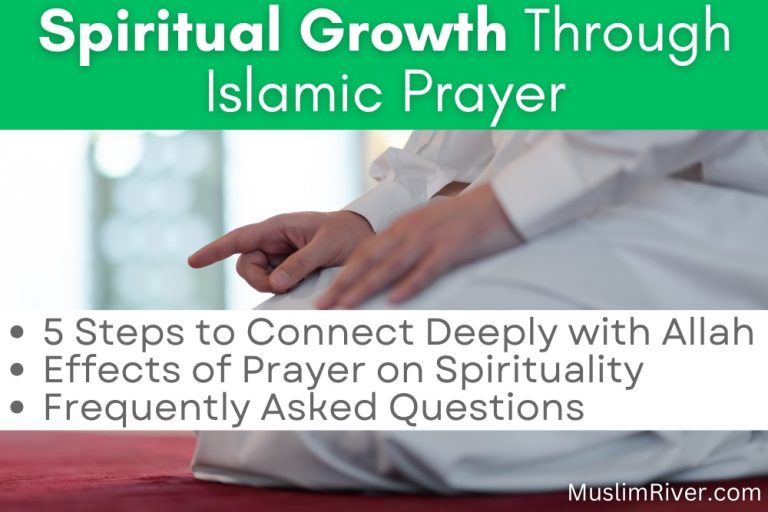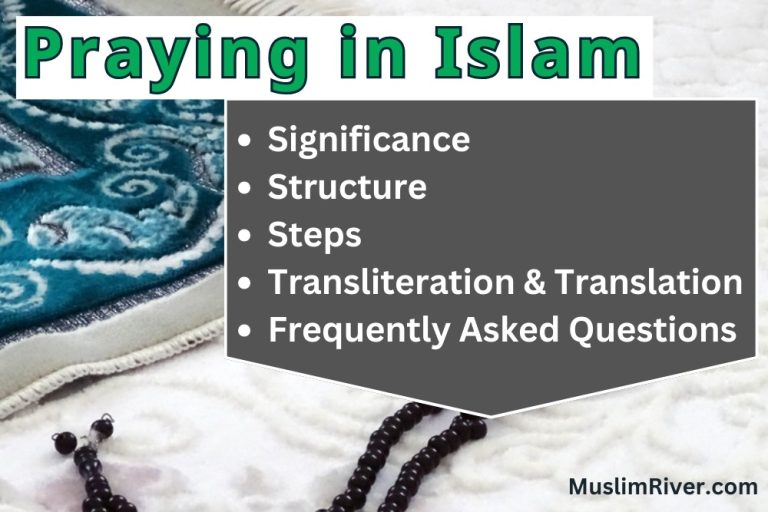Mental and Physical Health Benefits of Namaz (Islamic Prayer)
Namaz, or Salah, is more than a spiritual obligation within Islam—it’s a conduit to holistic wellness, practiced globally five times daily.
In crafting this discussion, extensive research was undertaken, focusing on the integration of both physical and spiritual aspects of Namaz.
Here you will explore the mental and physical health benefits of Namaz
By exploring these dimensions, we aim to enhance readers’ appreciation of Namaz, revealing its role in promoting mental clarity and physical health, alongside spiritual growth.
Stay tuned to discover the unexpected ways Namaz can boost mental health and physical well-being, providing more than spiritual solace.

Physical Health Benefits of Islamic Prayer
Have you ever considered how the daily rituals of Namaz can impact your physical health?
Beyond its spiritual significance, Namaz incorporates physical movements (Standing with raised hands, Standing still & Bowing) that enhance bodily functions in subtle yet profound ways.
Series of physical exercises that can improve your posture, flexibility, and overall health.
Here’s how these benefits manifest across different prayer positions:
1. Takbir (Standing with raised hands) — The initiation of prayer with Takbir involves standing with arms raised, aligning the spine engaging core muscles, and setting a peaceful and focused tone for the session.
This posture helps correct body alignment and sharpens mental focus.
💡 Tip: Try to maintain this posture for a few moments longer each day to strengthen your concentration and physical balance.
Arabic: حَدَّثَنَا الْحَسَنُ بْنُ عَلِيٍّ، حَدَّثَنَا مُعَاوِيَةُ، وَخَالِدُ بْنُ عَمْرٍو، وَأَبُو حُذَيْفَةَ قَالُوا حَدَّثَنَا سُفْيَانُ، بِإِسْنَادِهِ بِهَذَا قَالَ فَرَفَعَ يَدَيْهِ فِي
أَوَّلِ مَرَّةٍ وَقَالَ بَعْضُهُمْ مَرَّةً وَاحِدَةً .
Translation: He raised his hands once in the beginning. Some narrated: (raised his
hands) once only.
Source: Sunan Abi Dawud 749 – Prayer (Kitab Al-Salat) – كتاب الصلاة
2. Qiyam (Standing still) — Holding the Qiyam position strengthens the legs and core, fostering both physical and mental endurance.
This practice enhances concentration and mindfulness, crucial for both prayer and daily activities.
List of benefits:
- Improves leg strength
- Enhances core stability
- Deepens concentration
For example, by consistently practicing Qiyam, you may notice improved endurance during other activities like walking or running.
3. Ruku (Bowing) — This position stretches the lower back and strengthens core muscles, enhancing flexibility and blood circulation.
The forward bend in Ruku revitalizes your body by improving spinal health and circulation.
Spinal flexibility: Increases range of motion, and decreases back pain.
4. Sujood (Prostration) — Touching the forehead to the ground increases blood flow to the brain, boosting oxygenation and reducing stress.
This position promotes mental clarity and flexibility, which are beneficial for cognitive health.
Arabic: وَحَدَّثَنَا هَارُونُ بْنُ مَعْرُوفٍ، وَعَمْرُو بْنُ سَوَّادٍ، قَالاَ حَدَّثَنَا عَبْدُ اللَّهِ بْنُ وَهْبٍ، عَنْ عَمْرِو بْنِ الْحَارِثِ، عَنْ
عُمَارَةَ بْنِ غَزِيَّةَ، عَنْ سُمَىٍّ، مَوْلَى أَبِي بَكْرٍ أَنَّهُ سَمِعَ أَبَا صَالِحٍ، ذَكْوَانَ يُحَدِّثُ عَنْ أَبِي هُرَيْرَةَ، أَنَّ
رَسُولَ اللَّهِ صلى الله عليه وسلم قَالَ “ أَقْرَبُ مَا يَكُونُ الْعَبْدُ مِنْ رَبِّهِ وَهُوَ سَاجِدٌ فَأَكْثِرُوا الدُّعَاءَ
Translation: Abu Huraira reported: The Messenger of Allah (ﷺ) said: The nearest a
servant comes to his Lord is when he is prostrating himself, so make supplication (in
this state).
Source: Sahih Muslim 482 – The Book of Prayers – كتاب الصلاة
5. Tashahhud (Sitting position) — Sitting back on your legs aids digestion and helps maintain a healthy back posture.
This position supports the natural alignment of your spine and facilitates smoother digestive processes.
Checklist for Maximizing Physical Benefits from Namaz:
- Ensure proper alignment during each posture.
- Maintain each position long enough to feel a stretch or muscle engagement.
- Regularly practice to see improvements in flexibility and strength.
Through Namaz, you’re not just connecting spiritually; you’re also fostering significant physical health benefits.
By understanding and applying the principles of each posture, you can enhance your physical well-being while deepening your spiritual practice.
Embrace these routines as opportunities to care for your body and spirit alike.
Mental Health Benefits of Islamic Prayer
Have you ever considered how the disciplined practice of Namaz might improve your mental health?
Namaz might be the reset button you need & you will explore here how Namaz is reducing your stress, focus enhancement & mental clarity.
It combines meditative breathing and mindful movements to create peace in a hectic world.
Let’s explore how the intentional movements and focused intentions of Namaz can serve as a daily mental health practice.
a) Reduction of Stress and Anxiety
Namaz acts as a meditative practice, helping to reset stress levels through its structured, repetitive motions and focused breathing.
Consider how a few minutes of deep breathing in a stressful situation can bring calmness; Namaz incorporates this multiple times a day.
💡 Tip: Use the tranquility of early morning prayers to set a calm tone for your day.
Arabic: ٱلَّذِينَ ءَامَنُوا۟ وَتَطْمَئِنُّ قُلُوبُهُم بِذِكْرِ ٱللَّهِ ۗ أَلَا بِذِكْرِ ٱللَّهِ تَطْمَئِنُّ ٱلْقُلُوبُ
Translation: Those who believe and whose hearts find comfort in the remembrance of
Allah. Surely in the remembrance of Allah do hearts find comfort.
Source: Surah Ar-Ra’d – 28 – Quran.com
b) Enhancement of Mindfulness and Focus
The required concentration during Namaz can enhance your attention span and focus, which can translate into improved productivity in your daily tasks.
BENEFITS:
- Boosts daily productivity.
- Enhances concentration during tasks.
- Improves attentiveness in interactions.
Just as an athlete practices to keep their focus sharp, regular Namaz trains your mind for everyday attentiveness.
c) Improvement in Emotional Regulation and Mental Clarity
Regular engagement in Namaz provides a structured time for introspection, which can help regulate emotions and promote mental clarity.
Each session of Namaz can be seen as a session of mental decluttering, aligning thoughts and emotions with your spiritual and ethical values.
Checklist for Enhancing Mental Health Through Namaz:
- Consistently engage in all daily prayers.
- Focus on the meaning behind the words and movements.
- Reflect on the feelings and thoughts that arise during prayer.
This practice helps cultivate a mind that can better manage stress, focus sharply, and regulate emotions effectively.
Are you ready to embrace Namaz as a part of your mental wellness regimen?
Why Namaz Excels Over Other Meditation Practices
Are you searching for a holistic practice deeply integrated with spiritual growth and community connection?
Let’s explore why many find Namaz to be more impactful than Other Meditation Practices, especially for those seeking structured spiritual depth and communal engagement.
Namaz offers a structured approach to spirituality that might just transform your daily routine.
| Aspect | Namaz Advantages |
|---|---|
| Disciplined Schedule | Structured Spiritual Dialogue: Five daily prayers provide a consistent rhythm that integrates spirituality into everyday life. – Mindfulness and Purpose: Each session enhances mental clarity and focus, grounding me in my spiritual journey. |
| Spiritual Depth | Holistic Practice: Combines physical postures with profound spiritual recitations and intentions. – Grounding through Faith: Deeply rooted in Islamic faith, offering not just relaxation but spiritual uplift. |
| Community Engagement | Congregational Connection: Group prayers in mosques foster strong communal bonds and shared spiritual experiences. – Shared Experience of Faith: Enhances belonging and collective growth. |
By choosing Namaz as your spiritual practice, you not only commit to physical and mental discipline but also embrace a community that supports and grows with you.
Start today and experience the transformative power of disciplined spiritual practice!
Frequently Asked Questions
What is the prayer for mental health in Islam?
There isn’t a single designated prayer solely for mental health.
Instead, I find that the regular practice of Namaz—with its structured movements, mindful recitations, and moments of reflection—helps nurture mental well-being.
Many Muslims also turn to personal supplications (duas) for inner peace and clarity.
Which Surah is for health?
While there isn’t a specific Surah reserved exclusively for health, many find comfort and healing in reciting SURAH AL-FATIHAH & AYAT AL KURSI.
These verses are often embraced for their calming and protective qualities, contributing to both physical and spiritual well-being.
Conclusion
Reflecting on my journey with Namaz, I realize that this practice is not just a set of rituals, but a path to a healthier body and mind.
Namaz offers a unique blend of physical exercise, mental clarity, and spiritual connection that goes beyond simple physical movement.
I hope that as you explore these benefits, you, too, will find a sense of balance and peace.
- Namaz improves posture, flexibility, and overall physical health.
- It reduces stress and enhances mental clarity through mindful recitations and controlled breathing.
As you consider integrating Namaz into your life, remember that each step—whether in movement or in spirit—can lead to a more centered and fulfilling existence. How might this practice transform your daily routine and overall well-being?






